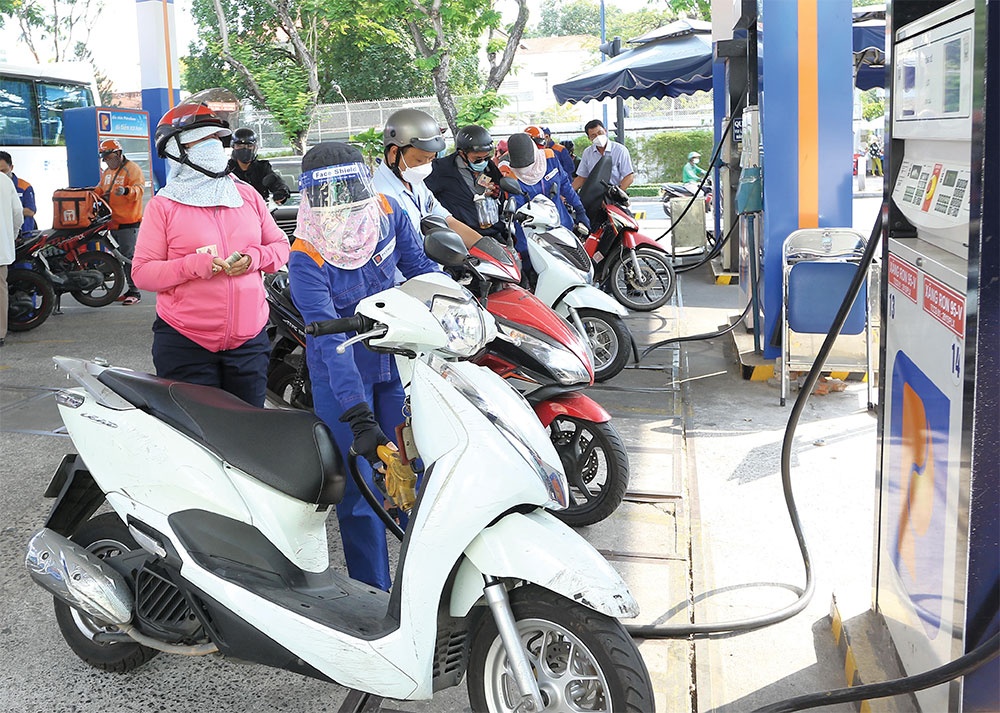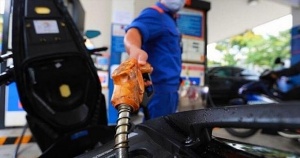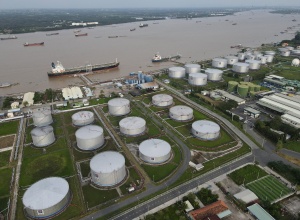Petrol retailers rue continuing hardship
At a workshop on amending two petroleum business decrees organised last week by the Vietnam Chamber of Commerce and Industry (VCCI) and the Ministry of Industry and Trade, a series of enterprises raised their voices over their mounting losses over the past year. They attributed the problem to the state’s strict regulations and improper methods of price management in the midst of global fluctuations.
 |
| Petrol retail groups have to contend with different rules in terms of operations compared to wholesalers, photo Le Tona |
Nguyen Dinh Cung, former director of the Central Institute for Economic Management, said that there have been signs of weakness in state management, causing disruptions in important markets such as petrol and bonds.
Specifically, Decree No.95/2021/ND-CP was issued in November 2021 to amend Decree No.83/2022/ND-CP. At the beginning of 2023, Decree 83 has to be revised again, but there remains many provisions containing vague and unclear content.
“The key is to create a management mechanism so that everyone can win. It is important to liberalise the market so prices can be set according to supply and demand, linking the domestic petroleum market with the international one,” Cung said.
Dau Anh Tuan, head of legal at the VCCI, said that the decree on petroleum trading has a great impact on petrol and oil businesses as well as local people. “As prices have been lower than costs, it has caused a supply disruption over the past time. Therefore, it is time to let the petroleum market operate by itself to create favourable conditions for enterprises to be profitable and achieve sustainable development,” Tuan said.
Many petrol stations have suspended operations, causing disruptions in the supply chains have suspended operations as it saved them money, while simultaneously causing disruptions in the supply chain. But he added that business regulations in state management have not solved the cost problem.
“Although state management has prevented retail petrol shortages by penalising gas stations for closing, this is only a temporary solution that works in the short term,” Tuan explained. “To revise the decree on petroleum trading, it is necessary to have a consistent view of fair competition, business freedom, and transparency. When this requirement is fulfilled, it will meet the needs of businesses and people.”
Vietnam has 17,000 retail petrol stations, with private companies owning two-thirds of them. Ha Thanh Tung, a representative of Ha Giang Transport Trading Co., Ltd. said, “Petrol retail businesses have suffered losses for the past year. During the toughest period, about 9,000 retail businesses across the country incurred a combined loss of $38 million a month. The sum from March 2022 to now could reach as much as $170 million.”
Meanwhile, petrol wholesalers were estimates to have generated profits of up to hundreds of millions of dollars in the fourth quarter of 2022. They sell goods without discount, while the input price is equal to the selling price. As a result, retail businesses have to cover their own business expenses, which leads to heavy losses.
Wholesalers are deemed to have more advantages than retailers, importing products and running their own gas stations to compete with retail businesses. As a result, they often enjoy more benefits in terms of standard profit and business expenses. They can also be proactive in sourcing goods and are not subject to penalties for ceasing petroleum sales. Moreover, they have the power to decide the discount rate, which leaves petrol retailers pointing to unfair competition.
Hoang An, director of Nhung Thanh Thuy Co., Ltd., said the firm only runs one petrol retail station without renting the premises, so the cost per litre of petrol is much lower than other businesses. However, she recommended that there be a minimum discount of 5-6 per cent off the retail price in order to be profitable.
“We invested in the petrol retail station with the capital of at least $845,000. The discount remained at a low level and then went back to zero. The rate has lasted for the whole year, putting mounting pressure on retail businesses. If the regulations on the minimum discount are not adjusted, this will force more lost businesses to leave the market and reduce state tax revenues,” she said.
An Hue Trading and Service Co., Ltd. is also incurring losses for its two petrol retail stations in the northern province of Bac Giang. The company struggles to maintain operations with monthly business expenses of around $4,200 and is mulling closing one station to reduce expense pressure.
Director Ho Van An said, “We are managing to maintain operations, but we will register with the regulatory body to reduce selling time soon. Retail businesses in the red have no motivation to compete in an unfair market with strict regulations.”
He said that if enterprises in other industries spend tens of billions of US dollars to do business, they have the right to pocket profits and bear losses. When they incur too many losses, they will stop doing business.
“Petrol retailers cannot be allowed to suspend operations because of losses, as they will be fined. Businesses in other industries can raise prices if the service or product is good. Petrol stations, on the other hand, cannot raise their prices on their own,” An added.
Giang Chan Tay, director of Boi Ngoc Co., Ltd., said that retail businesses have encountered enormous challenges amid the volatile market. The key is to build a decree that promotes long-term and stable petroleum businesses while ensuring energy security and economic development. “Compared to Cambodia or the Philippines, our gas stations frequently suffer losses, resulting in the deterioration of our national energy infrastructure,” he said.
Tran Duy Dong, director of the Domestic Market Department under the Ministry of Industry and Trade, spoke on behalf of the unit drafting the related legislation, saying that the operating agency must always ensure the supply of petrol as well as control of the consumer price index.
“Now is an opportunity for state management agencies to rethink how to operate the market, how to use state tools, and how far the state should intervene to ensure the nation’s energy security.”
 | Petrol and oil imports increased until end of June 2023 Due to the fluctuations in the global energy market that could last until next year, the Ministry of Industry and Trade (MoIT) is making efforts to ensure the supply of petroleum products in the domestic market. |
 | Retail businesses see potential in pharmaceutical retail In the context of rising inflation, many retail businesses can continue to grow thanks to bolstering their activities in the pharmaceutical sector. |
 | Ministry of Industry and Trade aims to stabilise petrol market In 2022, Vietnam imported 8.87 million tonnes of petroleum, worth $8.97 billion, a sharp increase of 27.7 per cent year-on-year in volume and an increase of 118.5 per cent in value. |
What the stars mean:
★ Poor ★ ★ Promising ★★★ Good ★★★★ Very good ★★★★★ Exceptional
Related Contents
Latest News
More News
- PM outlines new tasks for healthcare sector (February 25, 2026 | 16:00)
- Ho Chi Minh City launches plan for innovation and digital transformation (February 25, 2026 | 09:00)
- Vietnam sets ambitious dairy growth targets (February 24, 2026 | 18:00)
- Masan Consumer names new deputy CEO to drive foods and beverages growth (February 23, 2026 | 20:52)
- Myriad risks ahead, but ones Vietnam can confront (February 20, 2026 | 15:02)
- Vietnam making the leap into AI and semiconductors (February 20, 2026 | 09:37)
- Funding must be activated for semiconductor success (February 20, 2026 | 09:20)
- Resilience as new benchmark for smarter infrastructure (February 19, 2026 | 20:35)
- A golden time to shine within ASEAN (February 19, 2026 | 20:22)
- Vietnam’s pivotal year for advancing sustainability (February 19, 2026 | 08:44)

 Tag:
Tag:




















 Mobile Version
Mobile Version